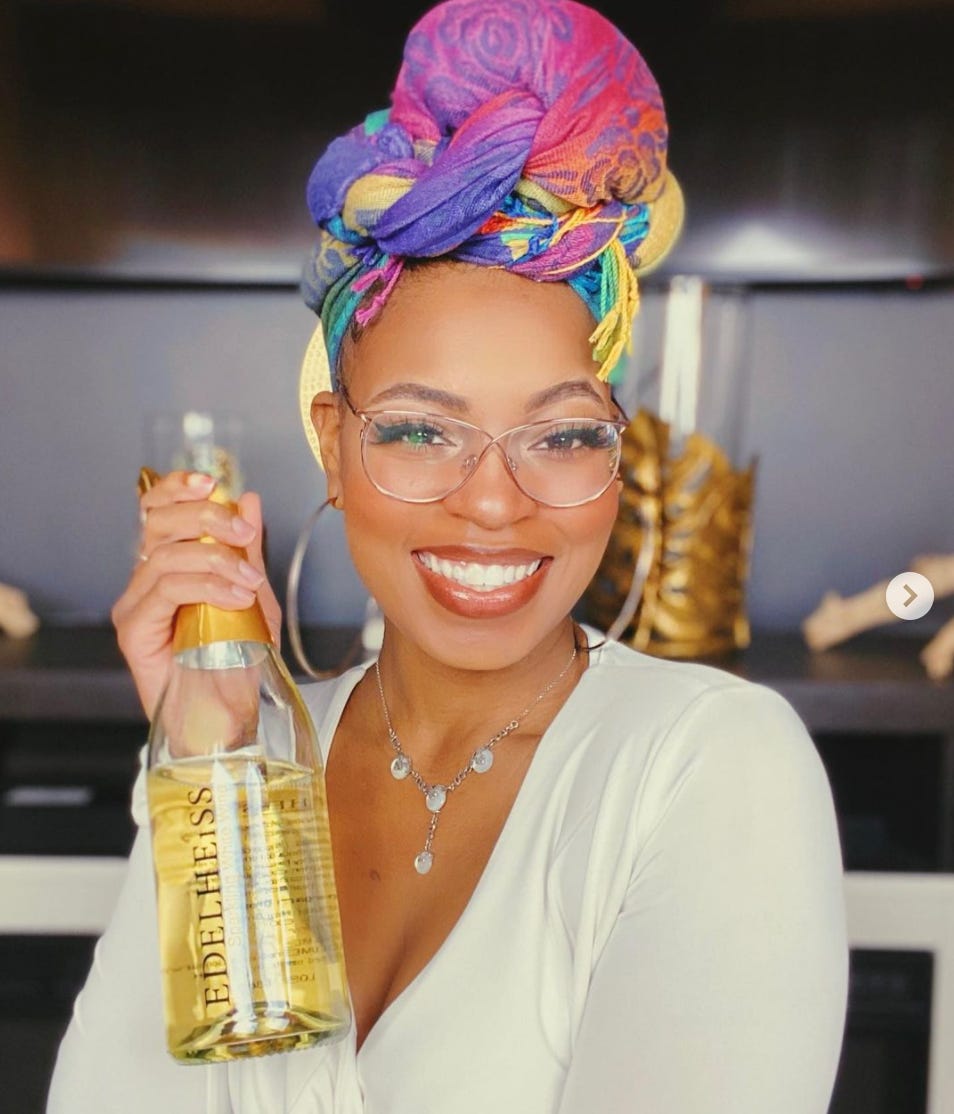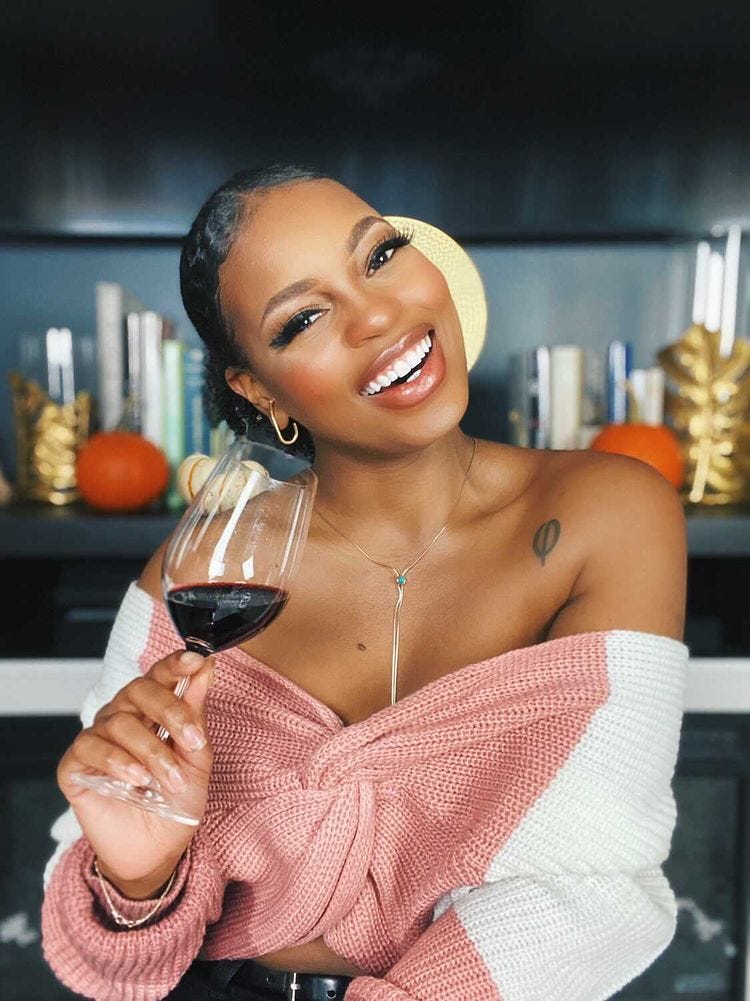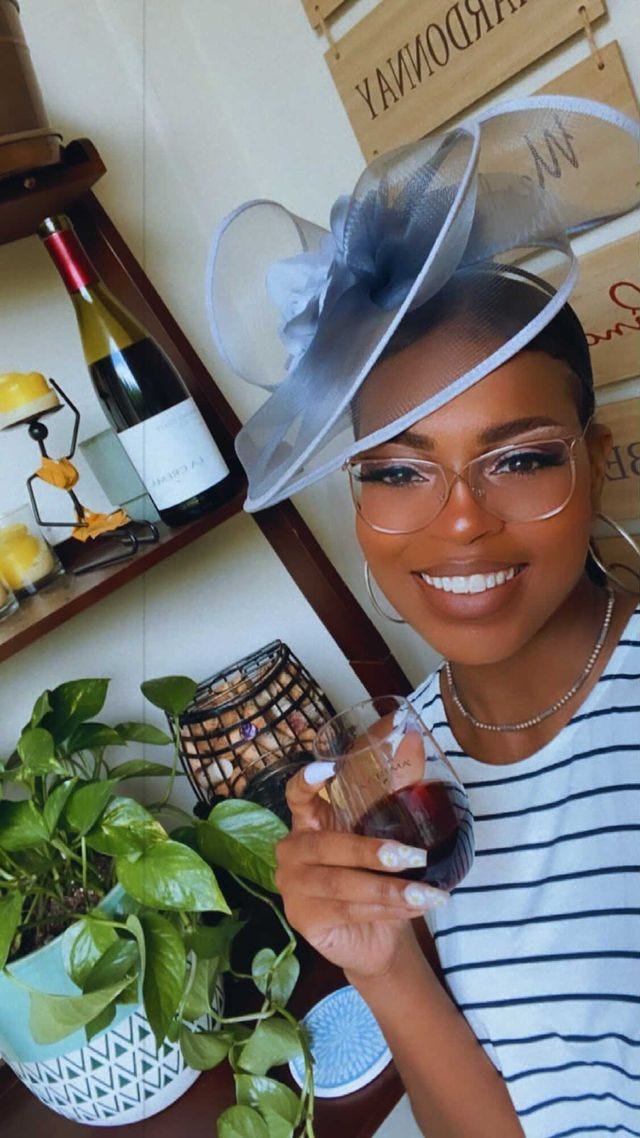The Fizz #19: Isis Daniel is staying centered through her social media success as The Millennial Somm
In this issue, Isis and I talk about her ~120K TikTok success as The Millennial Somm, how she makes relatable wine content, and how she stays centered when her job is to be online.
For the 19th issue of The Fizz, I spoke to sommelier and content creator Isis Daniel. I first found Isis on TikTok (an app that truly knows everything about me), where she creates content as The Millennial Somm. Isis’ TikTok videos focus on answering common consumer wine questions, giving visibility to wine brands that she loves, and sharing her favorite wine bars and vineyards—and she does it all with a comedic flair that makes the videos funny, relatable, and most importantly, accessible by everyone, no matter their level of wine knowledge.
What I love about Isis’ content is that it’s fun, and in a wine industry that overwhelmingly creates content for folks who are already familiar with wine basics, her videos are a breath of fresh air. They give consumers the answers they’re looking for, without making them feel like they’re not a part of the cool kids’ club. In this issue, we talk about her experience in the wine industry, how she stays centered in a world of social media, and her next steps for The Millennial Somm.

Margot: Can you tell me a bit about how you got into wine?
Isis: I was in the hospitality industry when I was in college. I stuck with it, started drinking wine when I turned 21. There was a sommelier who reached out to me, she saw that I was a woman, she saw that I was Black. She told me we were underrepresented in this industry and if this was something I was interested in that I should take some courses and see if it was something I’d like to pursue. That’s exactly what I did—I went to Capital Wine School here in D.C., fell in love with wine knowledge, and it took off from there.
My mom is a trainer, so she was really my biggest inspiration. I started teaching everything I was learning on social media for [my series] #TastingThursdays. From there, it continued to grow and build upon itself. When the pandemic hit, I was working at a wine bar. When that closed, I dove deeper into my social media experience, and a year later, here we are.
M: Did you work in social media in the past or did it come naturally to create content?
I: It’s crazy—not really. I had a small gig at the first restaurant I ever worked, that didn’t last long. I felt like social media didn’t come naturally to me at that point. I realized that maybe I just wasn’t in my niche yet, because wine content comes to me naturally. Me being goofy and being myself, I’m able to embrace social media in a way that I couldn’t before. Today, being The Millinnial Somm and doing this every day as my work—it’s night and day.
M: What I really love about your content is that it’s very non-pretentious and accessible to everyone, no matter their level of wine knowledge. As an industry person, your content also teaches empathy for the consumer that is incredibly valuable. You highlight questions that consumers have that many wine industry folks turn their nose at—for example, your orange wine video touches on this. What inspired you to create this type of content?
I: Being in the hospitality industry, you meet every kind of person there is under the sun. One of the problems that I faced, when I was in the hospitality industry before taking my first class in wine, was this perception that you had to pretend you knew everything as a server. If you don’t, it could affect the whole service—they teach you these bullet points and what you need to say so that you sound knowledgeable, even though you really don’t know. Once you say those sound bites, some people will test you and say oh well do you know this or that? That’ll put you in a position where you don’t feel good. I don’t agree with that.
Wine is ever-evolving, it’s impossible to know everything. There are many times I’ll have conversations with people at tastings—I’m only in Level Two [of my WSET certification]! I give people that grace because I want that grace in return. I’ve dealt with enough wine snobs to say that if I want to be in this industry, then I have to experience wine differently. If I have to be a wine snob in order to be in it, I don’t want to be here. I want love to be the center of everything I do. I extend that grace, yes because I want it too, but because the best way for people to learn is to come with kindness.
M: That’s so important. It does feel, when you’re just starting out, that you have to know everything, or “fake it til you make it”, which feels very disingenuous. How do you come up with the content in your videos?
I: When I first started, it was based off of my studies. Something would stand out to me and I’d make a video out of it. Sometimes people will ask questions—the orange wine video, that was a question that someone brought up. It’s interesting because that video wasn’t my experience, it was just an idea I wrote out. I’m inspired by many different things—a question, a daydream, what I’m studying. I’m a writer—the skits I do, I write them all the way out. When you’re a creative person, almost anything can inspire you.
M: When you’re creating this content, are you thinking about who your audience is?
I: Absolutely. When I first started, not so much. I would make videos just because I thought they were funny. Today, I’m very conscious of my followers because they’re so honest with me. I feel like I’ve created a space where they can be honest, so I try and create content that answers their questions.
M: Do you notice that you have a pretty diverse demographic following you—a big range of different folks?
I: Yes, absolutely. It’s very interesting, specifically on TikTok. On Instagram, it’s mainly wine professionals and wineries, but on TikTok—it’s these underage people who can’t drink yet but are interested in learning about wine, then you have millennials who know nothing about wine and don’t know where to start. TikTok makes me feel old—I’m 26! I also have a great following of people in their forties to sixties who follow me and comment. People say they enjoy my content because I say the things that they want to say but have never felt safe to say it, or a new side of the wine industry that they’ve never experienced.
M: It’s cool to hear about folks who are underage who follow you, because you’re essentially cultivating this new generation. I have so much hope for those folks to grow into a wine industry that is welcoming and not classist and exciting. It’s gotten pretty boring out here.
I: It’s so boring! It’s hard for me because I find a lot of content that bores me to death. I like to be entertained, so I try to make entertaining content. There need to be more people out there that make wine a little bit more accessible. We still need that informative content with a serious approach, though, for people who receive information in that way. We all need to be represented, and not just in one way.

M: Where do you think there’s space in the industry as it grows? Where are your hopes for growth?
I: My experience in the wine industry is different from almost any person I’ve ever met. I’ve seen how diverse the industry is—from personality to race to wine preference. I think the first step to allowing the industry to be more inclusive is to actually see the industry for what it is. There are so many African American people making wine, but we don’t know about them. It’s AAPI Heritage Month right now. I’m talking to different Asian winemakers and they’re talking about their experience around how there are many Asian winemakers out there, but we just don’t know about them.
We don’t know that we exist—we’re not in stores. 90-100% of wine in stores is made by white people. Not even breaking down how many women winemakers and owners are represented. We need to make sure that we acknowledge the diversity that already exists, uplift the diversity that already exists, and encourage everyone to go and talk to the restaurants, liquor stores, wine stores, and tell them that we need more people represented. Not just 50% either. It shouldn’t be 50% white people and 50% everyone else. We need across the board representation.
M: What you’re saying reminds me of The Fizz interview with Sunshine Foss of Happy Cork in Brooklyn, who was saying that she’s had conversations with Black winemakers who have been making wine for many years, but no-one will give them distribution. There’s such an opportunity for visibility here.
I: Yes. We need to be able to be who we are, and we need to be able to say it proudly. I was talking to my mom about the Asian American wine community, and my mom was saying that, well, you don’t want to be labeled “Asian wine”. It’s a double edged sword. I think you should be able to have wine and it just be wine, but I also think that the Asian community should know that if you want this as a career path, this is for you as well. You don’t have to be white to make wine.
We shouldn’t treat these winemakers like they can only sell to Asians, or can only be celebrated in the Asian American community or minority communities. You need to be celebrated as a winemaker. There can be times when you can highlight the fact that you’re Asian, that you’re Black, that you’re part of the LGBTQ+ community. There’ll be times for that, but you just need to be able to celebrate it without having it be labeled across your forehead every time you walk into a room.
M: You’re starting a vlog soon—what’s that about?
I: I am, I’m starting this week! I’m going to California in June and then doing a vineyard tour in August. Right now, the vlog is about me planning my trip and vineyard tour. It’s a whole tour, honey! The details are going to depend on the amount of vineyards I book and how I’m able to squeeze it into four weeks. There have been some vineyards that have said yes and they want me to visit, some that have paid for sponsorship slots. It’s moving in the right direction. This week, I’m really starting to plan out days and schedule.
M: So, episodes of different vineyards?
I: Absolutely!
M: Are you the one doing all of this yourself?
I: That’s right. My mom always likes to say “Isis likes to tie her own shoes”. I do have friends who are helping, but it’s mainly me. Everyone wants it to happen. A lot of people who I met via social media last year, who have been helpful, a lot of them are my friends now. It’s all love.
M: Where is your vision for your future in wine?
I: You know, I’m going to be really transparent here. Last year, I was contemplating and praying and meditating and trying to figure out when it’ll be an opportune time to quit my job and focus full time on The Millennial Somm. Then the pandemic hit, and I had an opportunity. I remember saying to myself, at the end of the pandemic, I don’t want to go back to this job. I want The Millennial Somm to become a source of income for me. I didn’t know that a year from then, those goals would be realized. Now, I’m looking at myself in the mirror and saying okay what’s next? I’m trying to figure it out.
I know that I want to continue The Millennial Somm and take it to television. I have visions of a wine bar that I want to open. Right now, my focus is on fully understanding the wine industry. I applied for the Murphy Goode job opportunity that everyone sent me—I had TikTokers go to Instagram, find my email, email me and say hey I found this opportunity for you.
M: That’s so great to see that kind of support.
I: It’s beautiful! It’s beautiful that you can impact people just by being yourself, and people want to see that, they want to see you grow. I want to be able to show people that the wine industry goes beyond working at a restaurant as a somm. There are a lot of different opportunities out there. I’m excited and hopeful to get this opportunity, not only for me, but for my followers as well.
M: As you start to understand the direction that you’re moving toward in the wine industry, are there resources that would be helpful for you as you make your choices?
I: If I could afford a true assistant, I would be living [laughs]. What I want to do is just make sure that I’m centered, so that when opportunities come, I want to be so centered that I don’t get lost in the “opportunity”. I want to stay honest. There’s probably another answer here that would be more appropriate to your question—what would help me decide on where I want to go? I want to step back and be focused on making sure that I’m moving with integrity, moving with honesty, conviction, and purpose—even if I don’t quite know where that purpose is going to take me.
All of the success I’ve had the blessing of experiencing—I’m just being myself. I want it to continue to be like that. I want my success, no matter how big it gets or small it maintains, I want to be happy doing what I love and have people organically appreciate what I create.
M: What have you learned from your experience creating this content and being appreciated on social media?
I: I’ve learned that social media is a roller coaster. TikTok will make you “famous”, but then take it all away. I went from getting thousands and thousands of views, to only 200 in a week, [and back up from there]. You have to be humble and understand that every success you get has a timeline and a max, and it’ll eventually expire. What happens when it expires? When you get tired? When you feel that your creative capacity has been pulled and you’re not sure what to do? How do you maintain? We’ve come to depend on social media, and I’ve learned that you can’t do that.
You have to just be consistent in yourself, push yourself as far as making consistent and good content. Whether the likes and follows are coming in or not, you need to be consistent and make sure that whatever your standard of quality is, you at least touch that standard. Don’t lower the bar because you’re tired. Eventually things map out and because you have that content and the drive, people will see it. It might not be in the timeline that you wanted, but it’ll always come back full circle.
M: Where do you find the joy in what you do now?
I: I find the joy in talking to people. Yesterday I hosted my Sunday tasting here, and what gets me going is when people ask questions. Being able to sit down and talk to people about wine—it makes me happy. I love what I do—I just want to get paid for it! I want to make a true living out of talking to people about wine, learning about wine, drinking wine. I just want to live, and have wine be in the center.
————
Non-profit Pairing: Isis supports DESTA Black Youth Network, an important organization that “supports Black youth aged 18 to 35 in reaching their educational, employability, and entrepreneurial goals through a holistic and individualized approach”. Learn more and donate here.
Liked this interview? You can support my work by becoming a paid subscriber to The Fizz. $5/month gets you all articles, plus tasting notes for interesting new American wines. 20% of your subscription goes to support St. Francis House.
Wine Class: On Sunday, May 16th, I’ll be joined by Oregon winemaker Brianne Day for a virtual wine class. We’ll talk through the wines she makes, how she made lemonade out of lemons during the wildfire season, & all the ways she supports her local winemaker community. Sign up here—20% of proceeds go to St. Francis House.





